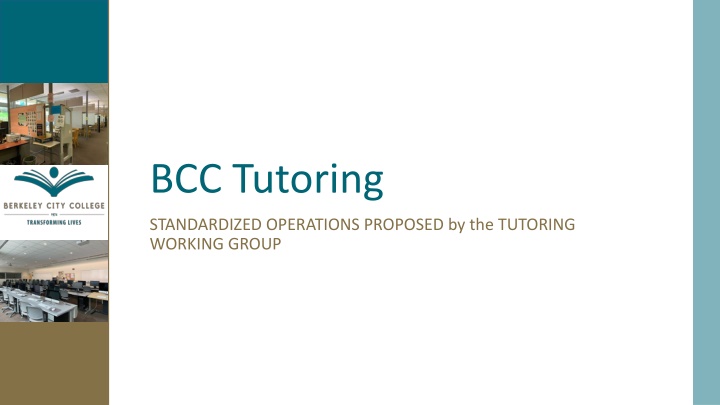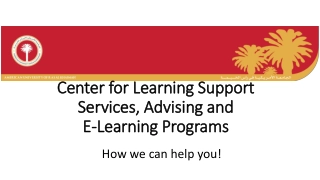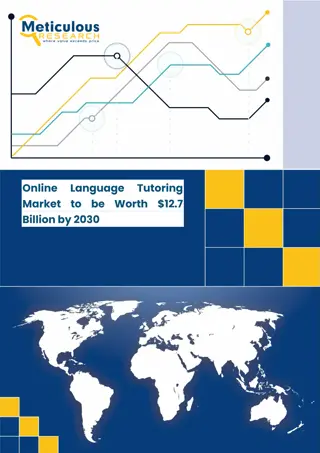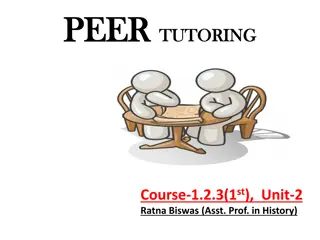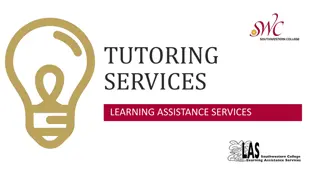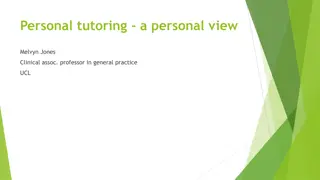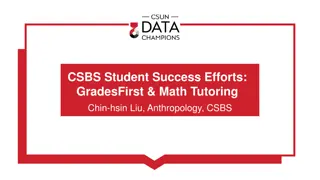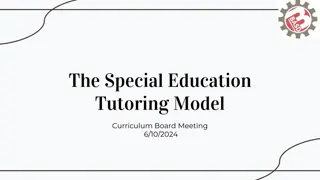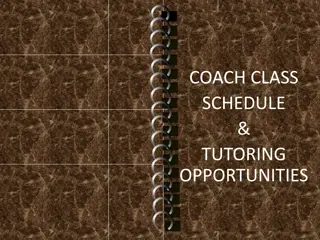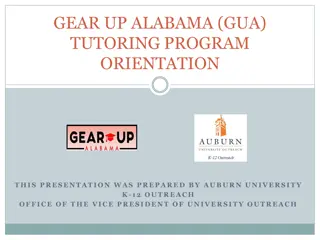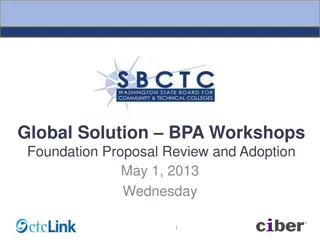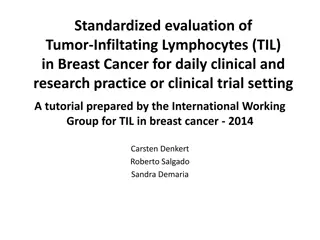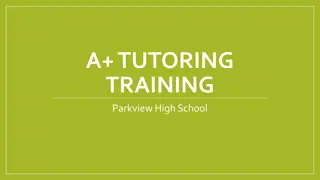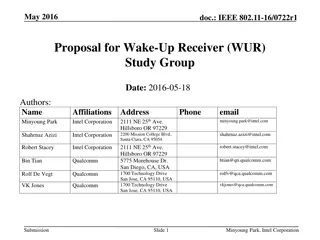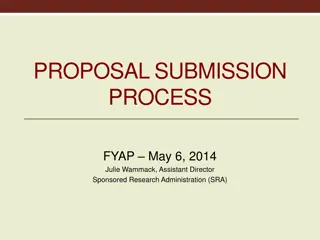Standardized Operations Proposal for BCC Tutoring Working Group
The BCC Tutoring Working Group has developed standardized operations for tutoring services in compliance with Title 5 regulations in the CA Education Code. This includes establishing tutor training models, designating campus centers, and refining processes for student referrals and tutor recruitment. Online tutoring practices and integrating tutors into courses are also emphasized. The group consists of faculty, students, staff, and classified staff members led by administrators. The group aims to streamline tutoring services, making it easier for all BCC students to access support.
Download Presentation

Please find below an Image/Link to download the presentation.
The content on the website is provided AS IS for your information and personal use only. It may not be sold, licensed, or shared on other websites without obtaining consent from the author.If you encounter any issues during the download, it is possible that the publisher has removed the file from their server.
You are allowed to download the files provided on this website for personal or commercial use, subject to the condition that they are used lawfully. All files are the property of their respective owners.
The content on the website is provided AS IS for your information and personal use only. It may not be sold, licensed, or shared on other websites without obtaining consent from the author.
E N D
Presentation Transcript
BCC Tutoring STANDARDIZED OPERATIONS PROPOSED by the TUTORING WORKING GROUP
Charge of Working Group To develop standardized operations for tutoring in compliance with Title 5 regulations in CA Education Code, including: Establishing a model for tutor training Designating campus tutoring centers Developing processes for referring students to tutoring, hiring tutors, and recommending students to be tutors Identifying best practices for online tutoring and embedding tutors in courses
Tutoring Working Group Members Faculty Students Staff Kelly Pernell Claudia Abadia Elisabeth Chemouni Jennifer Lowood Adan Olmedo Cora Leighton Thomas Kies Melina Bersamin Linda McAllister Siraj Omar Catherine Nichols Anthony Abuan Camille Lojewski Evan Stewart Rachel Dunton Jack Grodzinski Laura Lopez CLASSIFIED STAFF Stefanie Harding John Saenz ADMINISTRATORS Lisa Cook, Dean of Liberal Arts and Social Sciences Martin De Mucha Flores, Associate Dean of Educational Success
ALL BCC STUDENTS SHOULD KNOW Where to get tutoring. How to become a tutor.
Where students can get tutoring Start at the The Learning Resource Center (LRC)! The LRC will be the hub of all campus tutoring Students can access tutoring or be directed to labs and other designated centers from the LRC and LRC website Tutors will also be embedded in first-year math (1, 50, and 13) and English (1A ) courses, and other gateway courses across the curriculum
How students apply to be tutors Click on student button on LRC website Review Submit interest form requirements set by discipline
How faculty recommend students to be tutors Click on faculty button on LRC website Complete tutor recommendation form Submit recommendation to department
How faculty select tutors Request additional info to apply department selection criteria Review interest forms and recommendations Submit intent to hire form to LRC or Dean
TUTORING OPERATIONS: LRC HUB Maintains and publishes information about tutoring across the curriculum Directs EARLY ALERT students to tutoring Forwards tutoring interest forms to departments Processes paperwork for hiring for tutors that will work in the LRC Provides general tutor training program (with discipline specific modules) Assists tutors in completing practicum and applying for *CRLA certification DEPARTMENTS Notify LRC of tutoring offered each semester Determine and publish requirements for tutors Determine and apply selection criteria to hire new tutors Process paperwork for tutors in labs Opt into general training program for tutors (with discipline specific module) or apply for CRLA certification for their own program * College Reading & Learning Association
How selected students become tutors Hiring paperwork is completed in LRC (or deans office for special programs) Tutors complete free training during first semester as tutor Tutors complete practicum and apply for CRLA certification
How tutors get trained Complete 10 hours CRLA Level 1 training Complete practicum hours Apply for CRLA certification
Design of General Tutor Training Program All tutors receive training to meet Level 1 CRLA certification requirements Training is offered at no cost through workshops (in person) and Canvas (online) Training is offered in a flexible format to match students schedules Initial chunk of training is offered the week before classes begin If training is provided further after level 1, students would participate in training other students
Design of One Discipline-Specific Tutor Training Program Writing Coach Training/English Department All tutors receive training to meet Level 1 (General) and Level 2 (Meta-cognitive and Discipline-Specific CRLA certification requirements After the first semester, Level 2 tutors may apply to receive training to meet Level 3 CRLA certification requirements to become master tutors who are able to train other tutors Training is offered at no cost through workshops (in person), with supplemental materials through Canvas Training is synchronous, face-to-face, and interactive
Embedding Tutors in Courses: Best Practices to be Implemented Tutors receive specific training to be embedded in courses Faculty who are assigned embedded tutors attend a 1.5 hour training in best practices Instructor and tutor complete a contract at the beginning of the semester
Online Tutoring BCC will develop online tutoring taking a mixed method approach including synchronous and asynchronous options The LRC will button online tutoring on their landing page to direct students to options The college is committed to identifying an online platform to use our own tutors such as Cranium Caf Goal is to align with the Online Education Initiative criteria for online courses
Title 5 Tutoring Regulations
Title 5 Regulations and Tutoring 58168. Tutoring A method of instruction in credit and noncredit that involves a student tutor who has been successful in a particular subject or discipline who has demonstrated a particular skill who has received specific training in tutoring methods who assists one or more students in need of special supplemental instruction in the subject or skill.
Title 5 Regulations and Tutoring 58170. Apportionment for Tutoring Apportionment may be claimed for individual student tutoring only if all the following conditions are met: a. b. The individual student tutoring is conducted through a designated learning center. The designated learning center is supervised by a person who meets the minimum qualifications prescribed by section 53415. continued
Title 5 Regulations and Tutoring 58170. Apportionment for Tutoring conditions continued c. All tutors successfully complete instruction in tutoring methods and the use of appropriate written and mediated instructional materials, including supervised practice tutoring. This requirement may be waived by the chief instructional or student services officer on the basis of advanced degrees or equivalent training. Academic credit and apportionment for coursework in tutoring methods for purposes of this section shall be limited to two semester or three quarter units of credit, or 96 noncredit hours. All tutors shall be approved by a faculty member from the discipline or disciplines in which the student will tutor
Title 5 Regulations and Tutoring 58170. Apportionment for Tutoring conditions continued d. All students receiving individual tutoring have enrolled in a noncredit course carrying Taxonomy of Programs number 4930.09, which is entitled Supervised Tutoring. e. Students enroll in the Supervised Tutoring course, through registration procedures established pursuant to section 58108, after referral by a counselor or an instructor on the basis of an identified learning need. (Revised as of September 2018 by the Board of Governors and being considered by the Department of Finance).
Title 5 Regulations and Tutoring In addition to these conditions, however, some practitioners have raised questions regarding the appropriateness of providing apportionment opportunities to colleges for tutoring activity beyond basic skills, since many more students will be placed into transfer-level English and quantitative reasoning courses but will also need additional support. As a result of these questions, the Chancellor s Office has reviewed the Education Code language (EC 84757 (b)), which specifies, No state apportionment shall be made for any course or class that is not set forth in subdivision (a) and for which no credit is given.
Title 5 Regulations and Tutoring This language is generally responsible for the opinion that apportionment may not be claimed for student hours accumulated in a non-credit supervised tutoring course in support of a transfer-level course since transfer-level courses are not one of the categories in subdivision (a). Title 5 notes as a companion to 58172 that only in limited circumstances, such as English as a Second Language (ESL) and basic skills, may colleges offer non-credit supplemental learning assistance courses in support of credit courses. As a result, the Chancellor s Office has provided previous guidance that supervised tutoring apportionment may only be collected from students seeking help in basic skills courses because it is one of the nine categories included in the limited circumstance mentioned in the regulation.
Title 5 Regulations and Tutoring The Chancellor s Office has evaluated the language and determined that claiming apportionment in a supplemental learning course called supervised tutoring in order for students to develop the skills necessary for them to be successful is appropriate and permissible. To that end, the Chancellor s Office has determined that colleges may collect apportionment for non-credit supervised tutoring hours in which students are strengthening basic skills even if they are seeking support for such skills in transfer-level courses.
Title 5 Regulations and Tutoring Apportionment can only be claimed for the following: communication/literacy skills quantitative reasoning skills critical thinking skills Students seeking support for any of these skills, regardless of the course, endeavor to master a basic skill; therefore, claiming apportionment for the development of any of these areas in a supervised tutoring course is appropriate. The only change is to the interpretation that colleges may collect apportionment for support in transfer-level courses through supervised tutoring.
